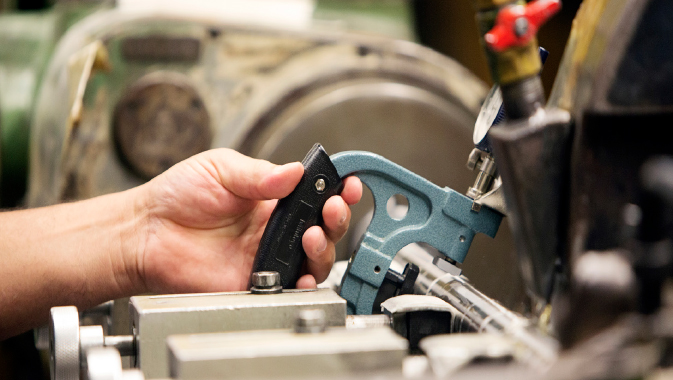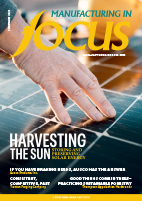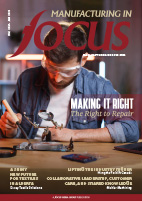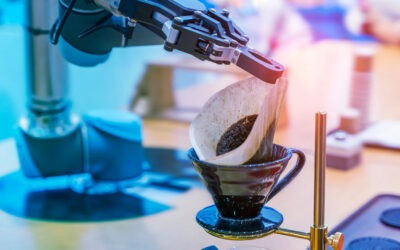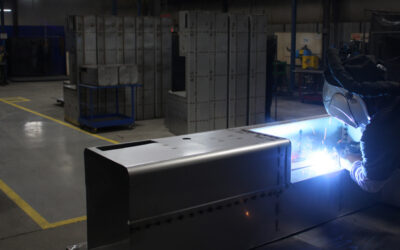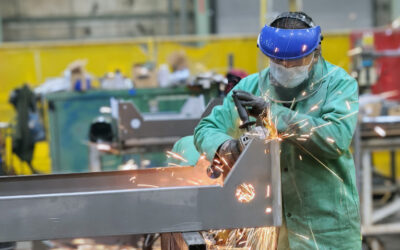Erickson Metals stands out in the metals industry as a supplier of highly specialized aluminum products. Erickson’s employees are empowered to do “Whatever it Takes” to provide excellent quality and service. With locations in four states, the company serves customers across the country.
~
Founded in 1972, Erickson Metals began as a small operation and has grown into a nationwide aluminum processor and supplier. “The company started out as a slitting house, purchasing wide-width aluminum coil, slitting it down to size for specific end-use applications, and reselling the smaller coils,” says Bob Stiles, Vice President of Operations.
In his 30-year tenure at Erickson Metals, Stiles has seen the company grow and evolve. In the 1980s the company integrated vertically, adding rolling and annealing to its in-house capabilities. “By the early 1990s we were fully integrated, receiving heavy gauge aluminum coil from major mills, and rolling, annealing, and slitting coil to provide aluminum slit coil for specialty applications,” Stiles says.
Today, the company performs annealing, rolling, sawing, shearing, and slitting in its facility in Cheshire, Connecticut, which features six slitting lines and three annealing furnaces. The company’s customizable product offerings include aluminum coils, sheets, plates, extrusions, tubes and pipes, and rods and bars.
Erickson Metals specializes in producing aluminum products that are too small in quantity for large aluminum mills and too demanding in quality or technical requirements for other, smaller producers. “We produce items that are not the standard, off-the-shelf products. They are specialized in that they have qualities that standard store-bought product doesn’t have,” Stiles says. These qualities include deep drawing, minimum earing, and custom surface finishes.
Erickson Metals’ specialized products are used in a variety of applications, including packaging, electronic, medical, transportation, telecommunications, machining, and many more. The company’s products could be used in “something as simple as a street sign that we’ve supplied the sheet metal for, to a much more technical application like a machined plate used by [the U.S. Department of Defense],” says Troy Erickson, President.
The company’s products are also used in cosmetics packaging. “Our metal has been used in lipstick tubes, perfume bottle tops, and covers for eyebrow pencils. Those products are deep-drawn and finely finished. We have to control the minimum grain size and minimum earing through metallurgy to achieve the results that will work for these deep-drawn parts,” Stiles says. Erickson customers also produce a variety of small, stamped parts.
To create these highly specialized products, Erickson relies on strong relationships with its vendors. “We’ve developed very good relationships with some of the mills. We’ve proven to them that we have no intention of competing with them, so they don’t hesitate to work with us on developing new products,” Stiles says.
Erickson Metals faces little competition in this niche market. The company has only one primary competitor in the U.S., and what little foreign competition exists has been reduced by the recently imposed tariffs on imported aluminum. The company also has distribution facilities in Denver, Colorado; Coon Rapids, Minnesota; and Santa Teresa, New Mexico. In these locations Erickson primarily resells aluminum cut to custom sizes.
When customers demand exceptional quality, Erickson Metals delivers. “We live by the motto, ‘Whatever it Takes’ and we pride ourselves on our quality initiatives and our on-time delivery,” Troy Erickson says. The company has received multiple awards for its commitment to service, on-time delivery, and quality initiatives.
Equally important is the company’s commitment to taking responsibility when a job doesn’t go as planned. “When you are working with machinery, sometimes things happen that you can’t control. It happens to the best of us in any industry and any organization. The important thing is how a company responds to an issue and what corrective action is taken,” Erickson says. “We are overly communicative with our customers, and if there’s ever an issue, we pick up the phone and talk with them about it.”
Erickson believes in seeing every issue as a learning opportunity. “When there’s a problem, we take responsibility and solve it. We identify the root of the problem and change the way we do things when we need to.” The company’s employees are empowered and encouraged to identify problems and seek out solutions. “From the people working in the shop, to our sales staff, to our management team, all of our employees know that if something isn’t right, they can say it and we’ll determine how to fix it. It’s a team effort that involves every single person, in all of our buildings, every single day,” Erickson says.
Indeed, Erickson Metals’ culture is built on collaboration, communication, and inclusiveness. “Across the company and in all of our locations, we’re communicating all the time, with an emphasis on sharing ideas and best practices,” Erickson says.
In the face of new supply and cost challenges, communication is more important than ever. “The challenge of material flow is very real, and it has spread very quickly across the whole marketplace,” says Stiles. In the last decade, Stiles has observed a drastic shift away from forecasting and carrying inventory. “Now, companies have started waiting to purchase raw materials for a job until the job is designed and the tooling is built, and then they want very short lead times,” he explains.
Across the manufacturing landscape, new tariffs also pose a challenge for companies that use aluminum as American suppliers strive to meet the growing demand for domestically produced metals. “When we look outside of the country, with a 10 percent tariff, [aluminum] becomes much more expensive. Now that we’re looking to source domestically, trying to get material on time can be a challenge,” Erickson explains.
Since the tariffs were announced in January, the lead time for aluminum rolled coil has grown from six to eight weeks to six months or more. Now more than ever, Erickson Metals relies on strong relationships with its vendor partners. “We have some tremendous relationships with our vendors, and work very closely with them.”
Erickson Metals is sensitive to the difficulty these extended lead times can cause for its customers. “We’ve always been proud of our ability to get what our customers need in a timely fashion, but the landscape has changed dramatically because of the supply and demand shift. It is imperative to re-educate all of our customers and communicate with them about the changes in timing. We’re trying to be more efficient, more proactive, and very focused on quality. The busier we get, the more efficient we want to be. And the last thing we want to do is sacrifice our quality because we’re trying to get something done quickly,” Erickson says.
“We want to continue to grow and get better at what we do best. We are investing in additional technology, from our servers in our computer systems to larger pieces of equipment. The only way for us to grow is to continue to invest heavily in our business, technology, and people.”

